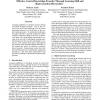Free Online Productivity Tools
i2Speak
i2Symbol
i2OCR
iTex2Img
iWeb2Print
iWeb2Shot
i2Type
iPdf2Split
iPdf2Merge
i2Bopomofo
i2Arabic
i2Style
i2Image
i2PDF
iLatex2Rtf
Sci2ools
121
click to vote
IJCAI
2007
2007
Effective Control Knowledge Transfer through Learning Skill and Representation Hierarchies
Learning capabilities of computer systems still lag far behind biological systems. One of the reasons can be seen in the inefficient re-use of control knowledge acquired over the lifetime of the artificial learning system. To address this deficiency, this paper presents a learning architecture which transfers control knowledge in the form of behavioral skills and corresponding representation concepts from one task to subsequent learning tasks. The presented system uses this knowledge to construct a more compact state space representation for learning while assuring bounded optimality of the learned task policy by utilizing a representation hierarchy. Experimental results show that the presented method can significantly outperform learning on a flat state space representation and the MAXQ method for hierarchical reinforcement learning.
Artificial Intelligence | Artificial Learning System | Control Knowledge | IJCAI 2007 | State Space Representation |
Related Content
| Added | 29 Oct 2010 |
| Updated | 29 Oct 2010 |
| Type | Conference |
| Year | 2007 |
| Where | IJCAI |
| Authors | Mehran Asadi, Manfred Huber |
Comments (0)

